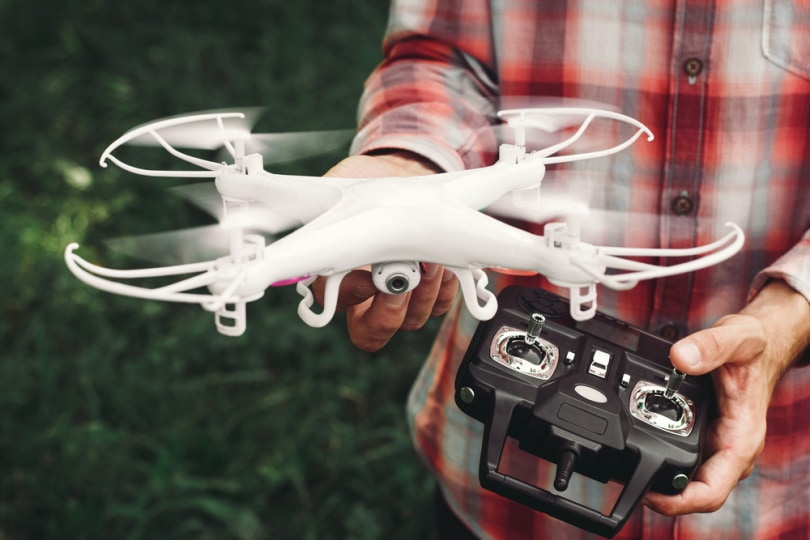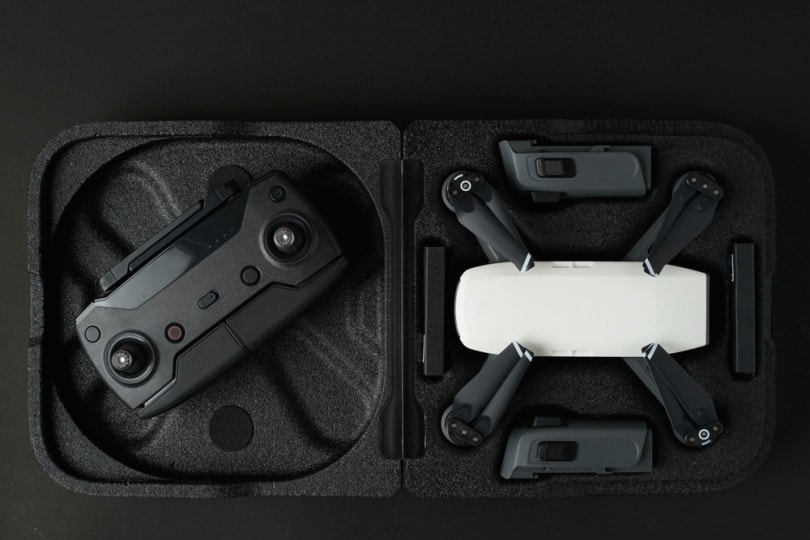Can You Bring a Drone on a Plane? What You Need To Know!
Last Updated on

If you’re trying to travel with your drone, the good news is that you can typically fly with it. However, there are limitations and special rules that you’ll need to follow.
Furthermore, these rules and stipulations can change depending on the airline that you fly with and the type of drone that you have. This guide breaks down everything that you need to know when you’re considering flying with your drone.

Can You Bring a Drone on a Plane?
The answer is that you can bring a drone on a plane most of the time. However, there are a few restrictions on drones, especially if they use lithium-ion batteries.
It’s best to keep your drone with you as a carry-on. TSA allows drones through the security checkpoints at airports, but you are restricted from putting drones with lithium-ion batteries in checked luggage.

Factors That Affect Whether You Can Bring a Drone on a Plane
When you’re considering whether you can bring your drone on a plane, there are two big factors to consider. First, you need to know what kind of batteries are in your drone, and second, you need to check the airline that you’re flying with.
Here is a deep dive into both factors and why they matter.
The Batteries
You need to determine whether your drone has lithium-ion batteries. If it does, it’s a safe bet that you’ll want to take your drone with you as a carry-on. Sometimes you can check it if it has less than 100 watts. But since many airlines don’t have the capability to check the watts, these drones are often banned outright.
However, if it uses another type of battery, you’ll need to check the specific TSA and airline restrictions for that type of battery.

The Airline
Before you assume that you can bring your drone with you on the plane or put it in checked baggage, look into the rules and regulations for whatever airline you’re flying on. If you’re flying on multiple airlines, check the regulations for each before bringing your drone along.
Each airline is allowed to come up with and enforce its own rules on drones, so even if your drone meets TSA standards, you might find that you still can’t bring it on the plane because of a specific rule that the airline has.
Tips for Bringing Your Drone On a Plane
If you’re going to bring your drone on a plane, there are a couple of things that you should do after confirming that you can bring it.

Turn It Off!
There are three reasons that you’ll want to have your drone off when it’s on a plane. First, drones use radio transmissions to get their directions. While it’s highly unlikely that these transmissions will interfere with the audio system that pilots use, we recommend keeping them off out of an abundance of caution.
Second, if you accidentally turn your drone on in a plane, there’s a good chance that you’ll damage it. That’s especially true if it’s inside of a bag. Also, a drone activating inside a plane or an airport is a surefire way to get yourself in trouble.
Finally, if your drone already has a charge, leaving it on for an extended period without using it will drain the battery! Save the battery by keeping the drone off.
Get a Special Carrying Case
Whether you’re checking your drone or bringing it on as a carry-on, we highly recommend getting a special carrying case to protect it from any damage.
Drones are full of small and breakable parts, and airlines aren’t exactly known for how well they handle things. Even if it’s a carry-on, if you have to put it into an overhead compartment, objects can move around and squish your drone. Even small shifts can lead to expensive damage. Get a special case to protect your drone, and you can save yourself some frustration.


Conclusion
Drones are a blast to use and operate, but moving them from place to place can be tricky. Do your research before trying to bring one onto a plane, and know that most airlines will work with you when trying to bring a drone aboard!
Featured Image Credit: Golubovy, Shutterstock
About the Author Robert Sparks
Robert’s obsession with all things optical started early in life, when his optician father would bring home prototypes for Robert to play with. Nowadays, Robert is dedicated to helping others find the right optics for their needs. His hobbies include astronomy, astrophysics, and model building. Originally from Newark, NJ, he resides in Santa Fe, New Mexico, where the nighttime skies are filled with glittering stars.
Related Articles:
Can You Use Binoculars to Look At Stars? How to Choose the Right Pair
How to Clean a Refractor Telescope: Step-by-Step Guide
How to Clean a Telescope Eyepiece: Step-by-Step Guide
How to Clean a Rifle Scope: 8 Expert Tips
Monocular vs Telescope: Differences Explained (With Pictures)
What Is a Monocular Used For? 8 Common Functions
How to Clean a Telescope Mirror: 8 Expert Tips
Brightfield vs Phase Contrast Microscopy: The Differences Explained
